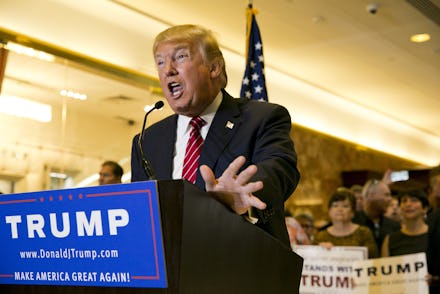Donald Trump's Tax Plan Calls for Enormous Cuts for Corporations and the Rich

Benjamin Franklin once said that "in this world, nothing can be said to be certain — except death and taxes." The First American clearly never met Donald Trump.
In a triumphant news conference at Trump Tower in New York on Monday, the billionaire Republican front-runner revealed the details of an ambitious tax plan that would eliminate taxes for millions of middle-class American households, as well as lower the highest marginal rate for the wealthy, simplify the tax code and eliminate the "carried interest" loophole that allows hedge fund managers to pay lower taxes.
"The economy is what I do well," Trump said at the event in the lobby of his eponymous tower in midtown Manhattan. Flanked by an anonymous crowd, Trump read the "amazing code" from a ream of paper in his hand, an unfamiliar sight for those used to Trump's more extemporaneous speaking style. "My plan reduces and eliminates most of the deductions and loopholes for the very rich — which means it's going to cost me a fortune," he said.
Nuts and bolts: Under Trump's plan, individuals earning less than $25,000 per year and married couples earning less than $50,000 per year wouldn't pay a cent in federal income taxes, which his campaign says would fully eliminate income taxes for nearly 75 million American households. "They get a new one-page form to send the IRS saying, 'I win,'" the campaign's release boasts.
For those remaining on the federal income tax rolls, Trump's plan simplifies the tax code from seven income brackets to four. The code would also benefit the wealthy, eliminating the so-called "marriage penalty" and the estate tax. Furthermore, the highest income-tax rate for those earning in excess of $300,000 per year would drop from 39.6% to 25% of an individual's income, the lowest top rate since Herbert Hoover was president. Trump also would cut the top capital gains rate to 20%, from the current 23.8%.
Businesses would largely benefit from Trump's policy as well. "No business of any size, from a Fortune 500 to a mom-and-pop shop to a freelancer living gig to gig, will pay more than 15% of their business income in taxes," Trump declared at the news conference. The campaign says this would make the corporate tax rate in the United States "one of the best in the world."
To pay for the cuts, which the campaign calls "revenue neutral," Trump has called for the elimination of deductions and loopholes available to the very rich, including the carried interest loophole that allows hedge fund managers to claim their compensation as capital gains, rather than salary. Trump would also institute a one-time "repatriation" levy against the estimated $2.1 trillion in corporate money held overseas by U.S. corporations.
What the experts say: Tax experts on the right are happy with the cuts, but skeptical about the cost. Chris Edwards, the director of tax policy studies at the libertarian-leaning Cato Institute, told Mic that many of Trump's proposals would be a welcome reformation of the U.S. tax code.
"The most important thing we can do is slash the corporate tax rate, and Trump does that," Edwards said over the phone. "Cutting the corporate tax rate to 15% would be the single most powerful thing policymakers could do to spur economic growth. A cut like that is long overdue."
But Edwards warned that the removal of 75 million households from any federal income tax liability might result in less accountability for government spending.
"I'm concerned with the idea of taking millions of more tax filers off the tax rolls at the bottom end of the income spectrum, as the Trump plan and other GOP plans do," he said. "Every major tax bill since the 1980s has taken more people off the tax rolls, such that today fewer people have 'skin in the game' in terms of paying for government programs in our democracy."
Whether the plan would truly be able to "pay for itself" is initially unclear. The far less ambitious tax plan of Trump's opponent, former Florida Gov. Jeb Bush, would cost the federal government $3.4 trillion over the next decade, and the plan doesn't involve the removal of nearly 50% of American households from any federal income tax liability. Although Trump declared at the news conference that his plan would boost economic growth "up to 5%," there's no clear indication any feasible amount of economic growth could pay for the trillions of dollars in lost revenue.
Despite the plan's ostensible populism — Trump has railed against tax loopholes that let "the hedge fund guys [get] away with murder" — the tax plan still gives the largest cuts to the country's highest earners.
"I am heartened by the fact that all the GOP tax plans, including Trump's, move in a generally supply-side direction, meaning that a main focus is lowering marginal tax rates for businesses, entrepreneurs and high-earning individuals," Edwards said.